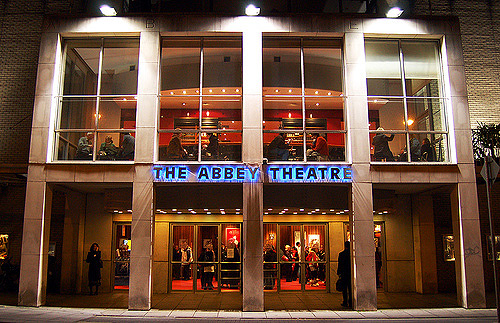Today’s Abbey Theatre programme announcement is one of the most highly anticipated in recent history. Following a year overshadowed by controversy and commemoration, 2017’s programme offered an opportunity to the directors to break away from tradition and begin their own chapter in the national theatre’s history.
Inevitably, the first aspect of the programme to be analysed will be gender balance, or lack thereof. In a press release, Chair of the Abbey Theatre’s Gender Equality Committee, Loretta Dignam, stressed that the Abbey “particularly welcome the significant number of women artists featuring in the programme”. While the programme currently counts a depressing total of two female playwrights, Teresa Deevy and Emma Donaghue, it also boasts five female directors. The final balance remains to be seen when the second half of the programme is announced in early 2017.
Clearly, 2017 is an effort to break with tradition. Not only is there no Sean O’Casey production in sight (the first sign of the apocalypse, surely), there are in fact no “classical” canon plays at all. Two film-to-stage adaptations, Jimmy’s Hall and Room are scheduled to premiere during the summer, a notable first for the Abbey. Furthermore, what many will consider the overdue debut of Enda Walsh in the national theatre will open the season in February 2017. Though producing his plays Arlington and Ballyturk one after the other is arguably overcompensation.
The directors have followed through on their promise to collaborate through co-productions with Theatre Royal Stratford East and the National Theatre of Scotland. Not only will this enable the production of Room, which they hope to stage with an all-black cast, but also the Christmas 2017 performances of Let the Right One In. The Abbey December show is usually an adaptation of a “classic” – recent years have seen The Dead adapted by Frank McGuinness, She Stoops to Conquer by Oliver Goldsmith, and You Never Can Tell by Bernard Shaw. Rather than taking a classical approach, Let The Right One In – adapted by the writer of Harry Potter and the Cursed Child – suggests the theatre is angling itself at a younger, contemporary audience for the holiday season.
Following on from the bottomless sea of 1916 productions last year, the Abbey is staging a remount of Corn Exchange’s 2004 Dublin by Lamplight, their alternative version of the founding of the national theatre. The directors saw the original production on tour in Edinburgh and were eager to put it on the national stage. It will potentially offer insight into the newcomers’ perception of Irish theatre.
Returning slightly more to form, 2017 will see the return of Waiting for Godot, in a Druid production directed by Gary Hynes, and an inevitably ambitious adaptation of Ulysses by Dermot Bolger. In what is either a stroke of genius or the new directors taking the phrase “bringing art to the masses” too literally, Roddy Doyle’s popular Two Pints serial will be toured as a site-specific performance to pubs across the country.
Beckett gets not one but two turns around the Abbey this year, with Lisa Dwan’s interpretation of his prose work in No’s Knife. Dwan’s performances are part of a welcomingly female-centric programme. As well as Room, Teresa Deevy’s 1936 play Katie Roche will be remounted in September, and Rough Magic bring The Train along in spring. The musical, first premiered in the Dublin Theatre Festival, tells the story of the 1971 contraceptive train and the women who were on board. Whilst there are still many issues to be addressed regarding gender in the theatre, an effort has clearly been made, and there is more to come, according to their Gender Equality Committee’s eight guiding principles for equality.
As well as all this, a new series of free previews will be introduced in 2017. Following in the footsteps of similar programmes in London theatres, free tickets will be available from the Abbey of the day of certain previews, “ensuring that there are no economic barriers in place and that the Abbey Theatre is open to all”, according to the press release. There can be no doubt that the theatre is hoping to attract new audiences from all backgrounds – how successful they are remains to be seen.
“What comes next…” offers some exciting departures from the Abbey Theatre which will hopefully re-ignite general interest in the national stage. The content is broader, but falls short of any supremely radical changes to the status quo. All eyes to the future to see what will come next, and whether audiences will like it.
The 2017 Abbey Theatre programme can be found here and the Abbey Theatre’s Eight Guiding Principles for Gender Equality can be found here.







